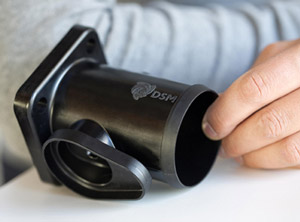DSM
Dutch first hydrolysis-resistant PET / Substitution opportunities in automotive engines
 DSM has produced a hydrolysis-resistant Arnite A polyester for dimension-critical auto parts (Photo: DSM) |
In what it claims is a breakthrough, Dutch chemical group DSM (Sittard; www.dsm.com) has launched a hydrolysis-resistant polyester that can be used in automotive engine compartments. The company says Arnite A-X07455, which contains 50% glass reinforcement, is the first high-performance PET that is highly resistant to hydrolysis – a reaction with water. It also exhibits high stiffness, strength and dimensional stability.
Wouter Gabrielse, automotive segment manager for DSM, notes: “Injection-moulded parts from conventional PET lose as much as half of their tensile strength after 1,000 hours at 85°C and 85% relative humidity. Parts made from Arnite A PET keep around 90% of their initial strength under the same conditions. With the new hydrolysis-resistant grade, we can enter into applications that are closer to the engine and which have never been achievable with PET.”
The new grade is being targeted at a variety of engine applications, including throttle valve bodies, sensors, air control valve housings, electronic throttle control and exhaust gas recirculation covers and ignition systems. DSM said Arnite A-X07455 can be substituted for metals or higher-cost engineering plastics such as polyphthalamides (PPA) and PPS, enabling car manufacturers to reduce costs and improve fuel efficiency through light weighting.
As a result of continuous engine downsizing, particularly in the compact car sector, engine temperatures have grown hotter, putting extra strain on plastic components. In addition, the use of identical electronic components around the world means they need to operate under a wide range of temperature and humidity conditions.
Wouter Gabrielse, automotive segment manager for DSM, notes: “Injection-moulded parts from conventional PET lose as much as half of their tensile strength after 1,000 hours at 85°C and 85% relative humidity. Parts made from Arnite A PET keep around 90% of their initial strength under the same conditions. With the new hydrolysis-resistant grade, we can enter into applications that are closer to the engine and which have never been achievable with PET.”
The new grade is being targeted at a variety of engine applications, including throttle valve bodies, sensors, air control valve housings, electronic throttle control and exhaust gas recirculation covers and ignition systems. DSM said Arnite A-X07455 can be substituted for metals or higher-cost engineering plastics such as polyphthalamides (PPA) and PPS, enabling car manufacturers to reduce costs and improve fuel efficiency through light weighting.
As a result of continuous engine downsizing, particularly in the compact car sector, engine temperatures have grown hotter, putting extra strain on plastic components. In addition, the use of identical electronic components around the world means they need to operate under a wide range of temperature and humidity conditions.
01.07.2013 Plasteurope.com [225702-0]
Published on 01.07.2013
